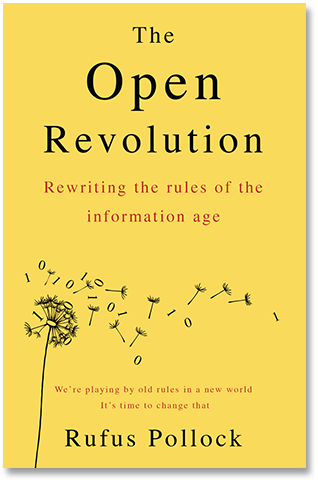The Open Revolution, book review: Ownership in the digital age


The Open Revolution: Rewriting the Rules of the Information Age • By Rufus Pollock • A/E/T Press • 123 pages • ISBN: 978-1983033223 • £9.99
In 1975 a fire in my apartment building took out the telephone connection. Five minutes after calling the phone company, I realized: I'd forgotten to first replace my very wired phone's $3 30-foot cord, bought from Woolworths, with AT&T's original 6-footer. Sure enough, the repairman took the cord into custody. AT&T controlled every aspect of what could be connected to its network; this was an illegal cord.
Geek culture tends to loathe telcos because they blocked innovation for years until the internet overwhelmed them, and even now they still battle against network neutrality. But that's just one aspect of open versus closed: add in the open source/free software movement that began with Richard Stallman in the 1980s, open access in scientific publishing, and access to medicines. What if we could get past the narrow, repetitive conversations around copyright, patents, and other intellectual property rights that polarise rights holders and activists trying to protect citizens' rights and the public domain?
This is what Open Knowledge co-founder Rufus Pollock tries to do in The Open Revolution: Rewriting the Rules of the Information Age. 'Open', he writes leads to both social benefits and economic growth, whereas 'Closed' benefits the few at the expense of the many. Instead of today's limited copyright and patent monopolies, Pollock proposes a system of a tax on advertising, levies such as a small surcharge on everyone's data plans, and 'remuneration rights'. The latter sound very like the mechanical licenses that pay songwriters in the recording business; you pay a standard industry-wide fee, but after the first recording no permission is required.
Open versus Closed
Pollock makes his case by reviewing the many ways the Closed system is broken and then explaining how Open can be expanded to cover software, pharmaceuticals, and other sectors. Pollock also promotes universal service platforms with regulatory oversight that mediate between artists and audience. These revenue streams would roll together into pools out of which artists and inventors can be paid. They should, he writes, be at least as large as the aggregated amounts they're paid now.
SEE: How to find files in Linux with grep: 10 examples (free PDF)
It's not the job of revolutionaries to stymie themselves by imagining the difficulties of turning their visions into reality. Pollock does cite some difficulties, but believes all this is genuinely possible given the will. Politics, money, entrenched interests, and even small-time creators tired of being ripped off -- all will align against him, as will the concentrated power amassed by Closed walled gardens such as Facebook (which John Oliver's writers call "a surveillance system disguised as a high-school reunion"). Many artists and creators are not fans of collecting society distributions; the long tail often earns less than the threshold for payouts.
Still, Pollock's ideas are worth thinking about. The next Isaac Newton can't stand on the shoulders of giants if the giants are locked in a cage.
RECENT AND RELATED CONTENT
The 4 hottest tech trends that are transforming the world in 2018
The revolution is happening right in front of our eyes, and it's not coming from politics, government, or world leaders. Here's where to look for it.
Fifty Things That Made the Modern Economy, book review: Inventions with unexpected connections
This book is fun to dip into for an unexpected insight or a bit of historical development. Everyone will know at least a few of the connections explored here, but few will know all of them.
Platform Strategy, book review: Business models for connected markets
This authoritative book explains how platforms connect different customer groups to enable transactions, allowing businesses to scale and create value.
European Union prepares to wreck internet with new copyright law
If passed, Article 13 will force all websites to check any and all posts for copyright violations. That will include photos, videos, words, tweets, memes, software code, etc, etc. Think about that for a minute, and shudder.
Why open source isn't just about code (TechRepublic)
Abby Cabunoc Mayes of the Mozilla Foundation explains why open source is about culture as much as it is about code.
Read more book reviews
- The 4th Industrial Revolution, book review: A curate's egg
- Cyber Wars, book review: High-profile hacks, deconstructed
- Driverless cars, book review: Do we know where we're going?
- A Dozen Lessons for Entrepreneurs, book review: Insights from the VC world
- What You Know About Startups Is Wrong, book review: Puncturing the myths